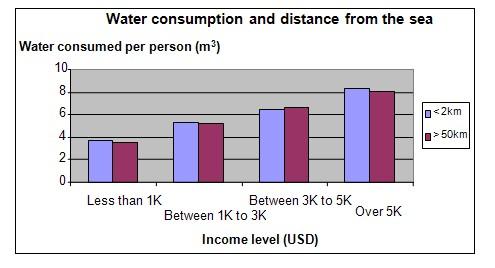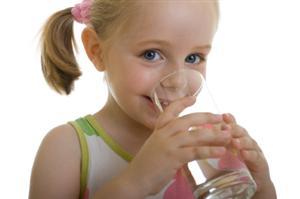| Complexity level: | 8 |
| Project cost ($): | 30 |
| Time required: | 1 day to prepare, 7 days for the science project experiment |
| Material availability: | Easily found |
| Safety concerns: | None |
Hypothesis
People who live near the oceans will consume less water.
Overview
Facts about water
Water is very important for life on earth. All life on earth requires water to survive. Water is used by us in many ways. Besides drinking water, we use it for cleaning, bathing and washing, growing crops, generating power and even putting out fires. Although almost 70% of the earth is covered in water, 98% of this water cannot be consumed by us, primarily because it is salt water. Less than 1% of the world’s water is fresh water that is safe for consumption.
A person may survive for up to a month without any food but he will not be able to survive more than a week without water. This is because over 60% of our body consists of water. Our blood cells consist of 92% water, our muscles and brains consist 75% water, and even our 22% of the weight of our bones comes from fluids within.
The fresh water on our planet is naturally replenished through the rain cycle. Water evaporates from the oceans and condense into cloud formations. These clouds move towards land and precipitate as rainfall. Rain water is either trapped in fresh water lakes or flows back to the oceans through the rivers.
Alas, our consumption of water is higher than the rate at which fresh water is replenished, making it necessary for us to conserve water. Our drinking water is processed in water treatment plants before it is pumped into our homes. Water that is discharged from our homes is also treated in septic tanks and water treatment facilities before being returned to the environment.
Scientific Terms
Materials
The materials required for this science fair project:
- 50 families that live within a 2 km distance from the ocean
- 50 families that live more than 50 km away from the ocean
- a computer to help analyze the data
- a survey form
- permission from your school’s administration, to obtain data from the students
Procedure
1. For this science project, the independent variable is the location of residence of the families – within 2 km from the ocean or over 50km from the ocean. The dependent variable is the average amount of water consumed by each person in the family. This is determined by calculating the data obtained from the students’ families. The constants (control variables) are the income levels of the families, the price of water and the constant supply of water to the homes.
2. To simplify this project, 2 schools are selected. One school is located within 2 km from the ocean while the other school is located over 50 km from the ocean.
3. Permission and assistance is obtained from the administration of the school to distribute the survey forms to 50 students from each school. Table 1 shows the sample survey form. The completed survey forms are collected a week later.
4. Once the survey forms are obtained, the data is analyzed with the help of a computer. The data obtained from both schools are separated according to the monthly income levels of the family. They are grouped as follows - less that US$1,000, between US$1,000 and US$3,000, between US$3,000 and US$5,000, and over US$5,000
5. The amount of water used per month in each household is divided by the number of persons living in the home in that month. This figure is then totaled for the whole year and divided by 12 to obtain the total amount of water consumed per person.
6. The average of the figure obtained in procedure 5 is calculated for each group and the result is recorded in table 2 given below.
Table 1 – Table used to source water consumption data from the students’ families.
Name |
School |
||
Total family income |
Distance from sea (tick) |
□ < 2km □ >50km |
|
Month |
Water used (m3) |
No. of persons in home |
Average water consumed, per person |
January |
|||
February |
|||
March |
|||
April |
|||
May |
|||
June |
|||
July |
|||
August |
|||
September |
|||
October |
|||
November |
|||
December |
|||
Total |
|||
Monthly Average (Total / 12) |

Results
The data gathered will very likely suggest that water consumption by residents living near the ocean and away from the ocean, is similar. What would probably make a difference to the amount of water consumption, is the income levels of the various families. The higher the income level, the higher the water consumption.
Table 2 – Average water consumption per person
|
Income level (RM) |
Average water used per person in a month (m3) |
|
|
< 2km from sea |
> 50km from sea |
|
|
Less than 1K |
3.7 |
3.5 |
|
Between 1K to 3K |
5.3 |
5.2 |
|
Between 3K to 5K |
6.4 |
6.7 |
|
Over 5K |
8.3 |
8.1 |
The graph below represents the results of our project.

Conclusion
The hypothesis that people who live near the ocean will consume less water, is proven to be false. However, as the income level of the families increased, , the average amount of water consumed also increased.
Water conservation is important for our planet and all creatures and plants living on it. Saving water helps to protect the environment and to reserve it for animals and fishes. We also save energy and cost by reducing our need for water processing and waste water treatment.
Also consider
The project can be repeated again by comparing the water consumption of families who live beside a river and those who don’t.
Try ascertaining the difference in consumption between urban families and rural families.
References
Why conserve water? - http://www.jea.com/community/education/efficiency/wisely/save.html
Water facts - http://www.waterinfo.org/resources/water-facts

